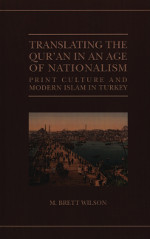|
|
| |

|

|
Wilson B. Translating the Qur'an in an Age of Nationalism. Print Culture and Modern Islam
in Turkey. Oxford University Press in association with the Institute of Ismaili Studies, London, 2014.
Over the course of the past two centuries, the central text of Islam
has undergone twin revolutions. Around the globe, Muslim communities
have embraced the printing and translating of the Qur’an,
transforming the scribal text into a modern book that can be read
in virtually any language.
What began with the sparse and often contentious publication of
vernacular commentaries and translations in the Ottoman Empire
and South Asia evolved, by the late twentieth century, into widespread
Quranic translation and publishing efforts in all quarters
of the Muslim world, including Arabic-speaking countries such
as Egypt and Saudi Arabia. This is remarkable given that at the
dawn of the twentieth century many Muslims considered Qur’an
translations to be impossible, impermissible and even impious.
Nevertheless, printed and translated versions of the Qur’an have
gained widespread acceptance by Muslim communities, and now
play a central, and in some quarters, a leading role in how the
Qur’an is read and understood in the modern world.
Focusing on the Ottoman Empire and Turkey, and following the
debates to Russia, Egypt, Indonesia and India, this book addresses
the question of how this revolution in Quranic book culture occurred,
considering both intellectual history as well the processes by which the
Qur’an became a modern book that could be mechanically reproduced
and widely owned.
 PDF-файлы PDF-файлы
Annotation, Contents, List of Illustrations, Acknowledgements
Ключевые слова
Коран
|
|
|
|
Случайная новость: Объявления |
|
22–24 апреля 2024 г. в ИВР РАН пройдет Третья Международная научная конференция «Рукописное наследие Востока», посвященная 140-летию со дня рождения Б.Я. Владимирцова (1884–1931). Предлагаем вашему вниманию программу. |
|
Подробнее...
|
|
|
|
|

